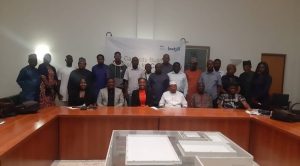Some civil society organisations (CSOs) have called on the Federal Government to expedite action on energy transition from fossil fuels to clean energy sources to prevent climate crisis.

BudgIT Foundation, Publish What You Pay (PWYP), Natural Resource Governance Institute (NRGI), Community Outreach for Development and Welfare Advocacy (CODWA) and Global Initiative for Food Security and Ecosystem Preservation (GIFSEP) made the call at one-day capacity workshop on energy transition in Abuja.
Mr Vincent Egoro, PWYP Senior Regional Coordinator, Anglophone Africa, said that the energy transition should be just and all-inclusive in order to secure a livable and sustainable future for all.
Egoro said, “For us in Nigeria and at PWYP, we want the energy transition to be just and inclusive, and this will require the reshaping of economic systems, policies, and financial instruments, as well as the adoption of new technologies and practices.
“This is where capacity building becomes important. By equipping all stakeholders with the knowledge, tools, and resources necessary to drive this transformation, we can achieve a just transition and ensure that it is sustainable.”
NRGI Senior Officer, Nigeria Programme, Tengi George-Ikoli, who also urged the government to act fast on energy transition, said the world was transiting to avoid extreme weather/climate crisis, caused by deforestation, floods, fires and sea encroachment.
George-Ikoli, who presented a paper titled, “Energy Transition in Nigeria: Policies, Prospects, Challenges, Opportunities and Strategies for Advocacy”, recalled that the past transitions included coal transition in 1800s, oil transition in 1920s, gas, hydro and nuclear transition in 1950s.
She added that there was solar and wind transition in 1900s, saying that the world was now transiting from fossil fuels to cleaner energy sources to avoid extreme weather/climate crisis.
“Countries signed Paris Agreement in 2015 to hold increases below 2-degree Celsius and limit temperature increase to 1.5-degree Celsius above pre-industrial levels.”
She stressed the need for government and relevant stakeholders to review and reshape economic systems, policies, and financial instruments fit into energy transition purpose for effective implementation.
In his remarks, Mr Enebi Opaluwa, Head, Natural Resource and Climate Governance, BudgIT Foundation, also emphasised the need for Nigeria to align with global energy transition, saying that many countries had transited from fossil fuels to cleaner energy sources.
Opaluwa said Nigerian government needed to act fast on energy transition because the demand for crude oil which earned the country’s revenue would soon decline.
According to him, there is need for government at all levels to ensure inclusion of vulnerable populations and underserved communities in their energy transition processes.
This, he added, could be achieved through awareness, enlightenment, education, empowerment and provision of different cleaner energy sources suitable for different vulnerable populations and their communities.
Also speaking, Executive Director of CODWA, Comrade Taiwo Otitolaye, said energy transition would only progress and be meaningful to the vulnerable populations and underserved communities if food security was guaranteed.
Otitolaye said, “A hungry person is an angry person; it is when vulnerable people eat, they will be happy and interested to listen to any enlightenment on energy transition.”
He urged CSOs to understand the difference between clean and renewable energy in order to inform and engage government strategically.
Otitolaye said that the sustainability objectives of clean and renewable energy vary in terms of environmental footmark, like land use for hydroelectric dams versus wind farms.
According to him, different energy sources require different technologies and infrastructure. For example, solar farms and nuclear plants need distinct resource allocations and planning.
By Priscilla Osaje
